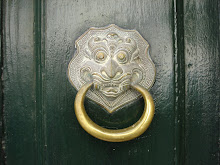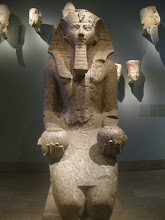I sit and think.
A friend of mine from the states and his mom were held at Tel Aviv airport for eight hours the other day. They threatened him with a gun. Because he has previously been in the north of the West Bank? Yes. Eventually they let them enter Israel, but they kept their luggage for three days.
I look out the taxi window and see the Wall, gray and concrete-y, tower up against the sky.
In Jerusalem, Palestinian families keep getting forced out of their homes by Jewish settlers. About 30 settlers entered the home of the Al-Kurd family in the Sheikh Jarrah neighborhood, threw out their furniture on the street below, and now refuse to leave. Meanwhile, Israeli police is blocking members of the Al-Kurd family from entering their own home.
We get to one of the checkpoints along the way. We pass through without having to show our identity cards or passports, round the bend in the road and come out on the other side of the mountain top. The road is packed--completely jammed with cars going in the opposite direction.
 For something like two or maybe three kilometers, there are cars and cars and cars. It's eight o'clock in the morning, people are going to work, to school, and Israel is blocking the checkpoint. We get stuck in the traffic jam as well, even though we are going in the opposite direction.
For something like two or maybe three kilometers, there are cars and cars and cars. It's eight o'clock in the morning, people are going to work, to school, and Israel is blocking the checkpoint. We get stuck in the traffic jam as well, even though we are going in the opposite direction.I sit at my boyfriend's house one evening, and we see a light down in the valley. He says:
"See that light? That's an Israeli jeep."
"How do you know?" I say.
He goes, "Because it's a settler-only road." Palestinians aren't allowed to use it.
We drive on through the West Bank landscape, down towards Al-Khalil. I keep looking out the taxi window, and in the distance, lower down in a valley, there's the concrete wall. I look at it. And think:
It doesn't look much from above. It really doesn't look much from above in a landscape that's seen thousands of years of human history. A temporary human construction in some kind of a vain attempt to control a land that is only yours because you took it by force. But nothing ever lasts, and neither shall this concrete wall.
But of course, for now it confines Palestinians behind it; restricts them; controls their lives.
A friend of mine has been homeless since the beginning of the year because they finished the construction of the Wall in his village, and his house is now on the Jerusalem side. His wife and children have Jerusalem identity cards and can stay in the house, but since my friend is a West Bank resident he had to leave his house. He gets to visit his wife and children five times per every three months, but he must return to the West Bank before 7 pm every day he goes to see them. In other words, he can't even sleep in his own house.
And why doesn't his wife and children come and stay in Ramallah with him? Because they stand to lose their Jerusalem identity cards if they do.

I keep looking out the taxi window. Pass road signs with the Arabic village names sprayed over by Jewish settlers who aim to eradicate every last claim Palestinians have to their own homeland.


















No comments:
Post a Comment